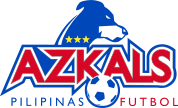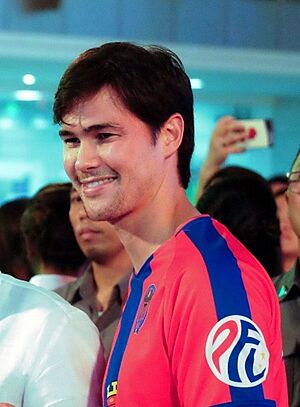Philippines national football team facts for kids
The Philippines national football team represents the Philippines in men's international football. It's managed by the Philippine Football Federation (PFF) and has been playing since 1913.
Before World War II, the Philippines often played against teams like Japan and China in the Far Eastern Championship Games. The national team has never qualified for the FIFA World Cup. However, they did qualify for the AFC Asian Cup once, in 2019. They also finished second in the 2014 AFC Challenge Cup, losing to Palestine in the final.
Unlike many countries in Southeast Asia where football is the most popular sport, in the Philippines, basketball and boxing are more popular. Before 2010, the Philippines usually got knocked out early in the AFF Championship. But since the 2010 AFF Championship, especially after the "Miracle of Hanoi" match, there's been a big effort to grow football in the country.
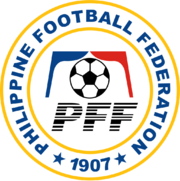 |
|||||||||||||||||
| Association | Philippine Football Federation (PFF) | ||||||||||||||||
|---|---|---|---|---|---|---|---|---|---|---|---|---|---|---|---|---|---|
| Confederation | AFC (Asia) | ||||||||||||||||
| Sub-confederation | AFF (Southeast Asia) | ||||||||||||||||
| Head coach | Carles Cuadrat | ||||||||||||||||
| Captain | Neil Etheridge | ||||||||||||||||
| Most caps | Phil Younghusband (108) | ||||||||||||||||
| Top scorer | Phil Younghusband (52) | ||||||||||||||||
| Home stadium | Rizal Memorial Stadium | ||||||||||||||||
| FIFA code | PHI | ||||||||||||||||
|
|||||||||||||||||
| FIFA ranking | |||||||||||||||||
| Current | 123 |
||||||||||||||||
| Highest | 111 (May 2018) | ||||||||||||||||
| Lowest | 195 (September – October 2006) | ||||||||||||||||
| Elo ranking | |||||||||||||||||
| Current | 172 |
||||||||||||||||
| Highest | 136 (June 16, 2015) | ||||||||||||||||
| Lowest | 218 (January 2000, December 2002, November 2006) | ||||||||||||||||
| First international | |||||||||||||||||
(Manila, Philippines; February 4, 1913) |
|||||||||||||||||
| Biggest win | |||||||||||||||||
(Tokyo, Japan; May 10, 1917) |
|||||||||||||||||
| Biggest defeat | |||||||||||||||||
(Tokyo, Japan; September 28, 1967) |
|||||||||||||||||
| Asian Cup | |||||||||||||||||
| Appearances | 1 (first in 2019) | ||||||||||||||||
| Best result | Group stage (2019) | ||||||||||||||||
| AFC Challenge Cup | |||||||||||||||||
| Appearances | 3 (first in 2006) | ||||||||||||||||
| Best result | Runners-up (2014) | ||||||||||||||||
| ASEAN Championship | |||||||||||||||||
| Appearances | 14 (first in 1996) | ||||||||||||||||
| Best result | Semi-finals (2010, 2012, 2014, 2018, 2024) | ||||||||||||||||
|
Medal record
|
|||||||||||||||||
Contents
History
Early Years: 1910s–1940s
The Philippines took part in the Far Eastern Championship Games, which included football. These games were the first big regional football tournament for national teams outside of Europe. The Philippines often played against Japan and China.
In the very first tournament in 1913, the Philippines beat China 2–1. In 1917, the team achieved its biggest win ever. Led by football star Paulino Alcantara, the Philippines defeated Japan 15–2!
After these games ended, the national team played in the 1940 East Asian Games. They finished third, behind Japan and Manchukuo.
Tough Times: 1950s–1990s
In the 1950s, the Philippines played friendly matches. However, the team didn't get much money or media attention. Football talent often came from the Manila Football League, which was supported by the Chinese-Filipino community. In 1958, the team surprised many by beating Japan 1–0 at the Asian Games in Tokyo.
But after 1958, Philippine football faced challenges. Many key players left the national team because they weren't paid enough. Some, like Ed Ocampo, even switched to basketball, where they could earn money. Rules that limited the number of foreign-blooded players also hurt the sport.
The national team suffered big losses in the 1960s. They lost 15–1 to Malaysia in 1962, and then 15–0 to Japan in 1967. To try and improve, foreign coaches were hired, like Englishman Allan Rogers and Spaniard Juan Cutillas.
In the early 1960s, the Philippine Football Association worked with San Miguel Corporation to get foreign help for training players and coaches. In 1971, coach Juan Cutillas brought in five foreign players. The team played in several international tournaments and even caused some upsets against teams like Thailand and South Korea. But the team declined again when the foreign players left due to money issues.
In 1991, under German coach Eckhard Krautzun, the national team had its best finish ever at the Southeast Asian Games, coming in fourth. They even beat defending champions Malaysia 1–0, with Norman Fegidero scoring the winning goal.
A New Beginning: 2000s
In September 2006, the Philippines' FIFA ranking dropped to its lowest ever, 195th. By the end of that year, they moved up to 171st after doing well in the 2007 AFF Championship qualification. They won three games in a row for the first time, which helped them qualify for the 2007 AFF Championship.
However, they didn't meet their goals in the tournament, only getting one draw. This led to the coach's resignation. The PFF also decided not to enter the 2010 FIFA World Cup qualifiers, choosing to focus on local and regional competitions instead.
In 2009, businessman Dan Palami became the team manager. He invested his own money into the team and started "Project 100," aiming to get the team into the top 100 in the FIFA rankings. More Filipino players born abroad were invited to join the team.
Era of Renaissance: 2010s
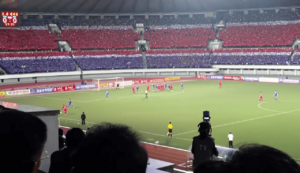
The Philippines' journey in the 2010 AFF Championship was a huge turning point. They qualified for the tournament and, for the first time, made it out of the group stage without losing a single game. Their 2–0 win against defending champions Vietnam was a massive surprise, known as the "Miracle of Hanoi". This match is seen as the start of a football comeback in the Philippines. They lost in the semifinals to Indonesia.
In 2011, Michael Weiß became the head coach. The team qualified for the 2012 AFC Challenge Cup and got their first-ever win in a FIFA World Cup qualification match, beating Sri Lanka 4–0.
In 2012, the Philippines reached the semifinals of the AFC Challenge Cup for the first time. They beat former champions India and Tajikistan, eventually finishing third. They also won the 2012 Philippine Peace Cup, their first title since 1913. At the 2012 AFF Championship, they again reached the semifinals but lost to Singapore.
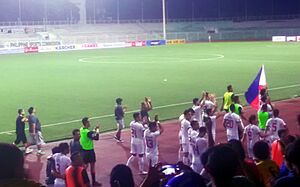
The Philippines made it to the final of the 2014 AFC Challenge Cup, with a spot in the 2015 AFC Asian Cup on the line. They lost 1–0 to Palestine. They also reached the semifinals of the 2014 AFF Championship.
Under coach Thomas Dooley, the team achieved their first away win in a World Cup qualifier in October 2015, beating Yemen 2–0. This helped them move to the third round of the Asian Cup qualifiers.
In 2018, the national team reached its highest-ever FIFA ranking at 111th. They secured their spot in the 2019 AFC Asian Cup by defeating Tajikistan 2–1 at home. This was a historic moment, as it was their first time qualifying for the Asian Cup.
At their debut in the 2019 AFC Asian Cup, the Philippines lost all three group matches. However, Stephan Schröck scored a historic goal for the team against Kyrgyzstan.
Recent Games: 2020–Present
After their Asian Cup debut, the Philippines started their 2022 FIFA World Cup qualification journey. They had a tough start, losing 5–2 to Syria at home. But they bounced back with two away wins against Guam and Maldives. They also managed an impressive goalless draw against China at home, thanks to great goalkeeping by Neil Etheridge. However, they lost to Syria again and later to China, which meant they didn't qualify for the 2022 World Cup. Still, finishing third in their group helped them qualify for the third round of the 2023 AFC Asian Cup qualifiers.
In the 2023 AFC Asian Cup qualifiers in Mongolia, the Philippines drew with Yemen and beat hosts Mongolia 1–0 with a late goal from Gerrit Holtmann. However, they lost 4–0 to Palestine. Despite finishing second in their group, they were the lowest-ranked second-place team and did not qualify for the 2023 AFC Asian Cup.
In the 2026 FIFA World Cup qualification, the team finished last in their group with one draw against Indonesia and five losses.
In January 2024, long-time general manager Dan Palami stepped down. The Philippines was invited to the 2024 Merdeka Tournament and the 2024 King's Cup. In the 2024 ASEAN Championship, they drew their first three group matches. Needing a win against Indonesia in their final group game, they won 1–0 with a penalty from Bjørn Martin Kristensen, securing a spot in the semifinals. In the first leg of the semifinals on December 27, 2024, Kike Linares scored a late goal in stoppage time to give the Philippines a 2–1 win against Thailand, their first victory over Thailand in 52 years. However, they lost the second leg 3–1, ending their tournament run.
The team is currently playing in the 2027 AFC Asian Cup qualification. As of July 2025, they have won one match against the Maldives (4-1) and drawn one against Tajikistan (2-2).
Team Image
Supporters
The national team has dedicated fan groups, like the Ultras Filipinas, formed in 2011. These groups cheer loudly for the team during games.
Colors
| Kit suppliers of the Philippine national team | |
|---|---|
| Company | Dates |
| 1996 | |
| 1996–2004 | |
| 2005 | |
| 2006 | |
| 2008–2012 | |
| 2012 | |
| 2012–2015 | |
| 2015–2021 | |
| 2021–2023 | |
| 2023–2024 | |
| 2024–present | |
The team's traditional home kit is blue jerseys, white shorts, and red socks, similar to the French team. Recently, the kits have been all-blue, all-red, or all-white. Currently, the home jerseys are all-white.
Puma is the current official kit supplier. Other brands like Adidas and Mizuno have also supplied kits in the past. In 2015, local company LGR Sportswear became the official provider, and their kits featured Filipino weave designs and the three stars and sun from the Philippine flag.
Names
The team is officially known as PHI by FIFA and other football organizations. In the past, local media called them the "RP Booters" or "RP XI" (RP stood for Republika ng Pilipinas). This changed to "PH/PHL Booters" or "PH/PHL XI" to match international standards.
They were also sometimes called the "Tri–Stars," referring to the three stars on the Philippine flag.
The most popular nickname for the national team is "Azkals." This name came from an online football community. They suggested "Calle Azul" (Spanish for "Streets of Blue"), which became "Azul Calle," then "AzCal," and finally "Azkal." The word "Azkal" is similar to a Filipino term for a street dog. "Azkals" became very popular during the 2010 AFF Championship. The Philippine Football Federation officially used the name until 2023.
Home Stadium
In the early days, the team played at the Manila Carnival Grounds, which later became the Rizal Memorial Sports Complex. The Rizal Memorial Stadium in Manila has been the main home venue for many years. It can hold 12,000 people.
In May 2015, the team announced the 25,000-seat Philippine Sports Stadium in Bocaue, Bulacan as their new home. However, due to low attendance, the Philippine Football Federation decided to use Panaad Stadium in Bacolod as the national team's home for the 2019 AFC Asian Cup qualifiers.
The Rizal Memorial Stadium has also been used for track and field, and its condition has sometimes been poor. There were plans to make it a modern football stadium again. The national team has also played official matches in Cebu City and Barotac Nuevo, Iloilo.
| Philippines national football team home stadiums | ||||
|---|---|---|---|---|
| Image | Stadium | Capacity | Location | Last match |
 |
New Clark City Athletics Stadium | 20,000 | Capas, Tarlac | v (June 10, 2025; 2027 AFC Asian Cup qualification) |
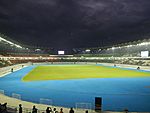 |
Philippine Sports Stadium | 20,000 | Santa Maria, Bulacan | v (November 25, 2016; 2016 AFF Championship) |
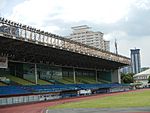 |
Rizal Memorial Stadium | 12,873 | Manila | v (December 27, 2024; 2024 ASEAN Championship) |
 |
Panaad Stadium | 10,500 | Bacolod | v (October 15, 2019; 2022 FIFA World Cup qualification) |
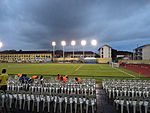 |
Cebu City Sports Center | 5,500 | Cebu City | v (April 27, 2014; Friendly) |
Results and Fixtures
Here are some of the recent match results for the Philippines national football team.
2024
| June 6 2026 World Cup qualification | Vietnam |
3–2 | Hanoi, Vietnam | |
| 19:00 UTC+7 | Stadium: Mỹ Đình National Stadium Referee: Hanna Hattab (Syria) |
| June 11 2026 World Cup qualification | Indonesia |
2–0 | Jakarta, Indonesia | |
| 19:30 UTC+7 | Stadium: Gelora Bung Karno Stadium Attendance: 64,942 Referee: Rustam Lutfullin (Uzbekistan) |
| September 4 2024 Merdeka Tournament SF | Philippines |
1–2 | Kuala Lumpur, Malaysia | |
| 21:00 UTC+8 | J. Tabinas |
|
Stadium: Bukit Jalil National Stadium Attendance: 3,658 Referee: Yudi Nurcahya (Indonesia) |
| September 8 2024 Merdeka Tournament Third place | Philippines |
0–0 (3–4 p) |
Kuala Lumpur, Malaysia | |
| 16:30 UTC+8 | Stadium: Bukit Jalil National Stadium Attendance: 180 Referee: Razlan Joffri Ali (Malaysia) |
|||
| Penalties | ||||
|
|
|||
| October 11 2024 King's Cup SF | Thailand |
3–1 | Songkhla, Thailand | |
| 20:00 UTC+7 | Stadium: Tinsulanon Stadium Attendance: 24,000 Referee: Ngô Duy Lân (Vietnam) |
| October 14 2024 King's Cup Third place | Philippines |
3–0 | Songkhla, Thailand | |
| 16:30 UTC+7 | Stadium: Tinsulanon Stadium Referee: Warintorn Sassadee (Thailand) |
| November 14 Friendly | Hong Kong |
3–1 | So Kon Po, Hong Kong | |
| 20:00 UTC+8 | Stadium: Hong Kong Stadium Attendance: 4,966 Referee: Warintorn Sassadee (Thailand) |
| December 12 2024 ASEAN Championship | Philippines |
1–1 | Manila, Philippines | |
| 18:30 UTC+8 |
|
Stadium: Rizal Memorial Stadium Attendance: 1,589 Referee: Kim Dae-yong (South Korea) |
| December 15 2024 ASEAN Championship | Laos |
1–1 | Vientiane, Laos | |
| 17:30 UTC+7 | Stadium: New Laos National Stadium Attendance: 6,389 Referee: Ryo Tanimoto (Japan) |
| December 18 2024 ASEAN Championship | Philippines |
1–1 | Manila, Philippines | |
| 21:00 UTC+8 | Stadium: Rizal Memorial Stadium Attendance: 3,346 Referee: Akobirxuja Shukurullaev (Uzbekistan) |
| December 21 2024 ASEAN Championship | Indonesia |
0–1 | Surakarta, Indonesia | |
| 20:00 UTC+7 |
|
Stadium: Manahan Stadium Attendance: 17,390 Referee: Koji Takasaki (Japan) |
| December 27 2024 ASEAN Championship SF Leg 1 | Philippines |
2–1 | Manila, Philippines | |
| 21:00 UTC+8 | Stadium: Rizal Memorial Stadium Attendance: 10,087 Referee: Kim Dae-yong (South Korea) |
| December 30 2024 ASEAN Championship SF Leg 2 | Thailand |
3–1 (a.e.t.) (4–3 agg.) |
Bangkok, Thailand | |
| 20:00 UTC+7 | Stadium: Rajamangala Stadium Attendance: 31,876 Referee: Kimura Hiroyuki (Japan) |
2025
| March 25 2027 AFC Asian Cup qualification | Philippines |
4–1 | Capas, Philippines | |
| 19:00 UTC+8 | Stadium: New Clark City Athletics Stadium Attendance: 3,334 Referee: Daniel Elder (Australia) |
| June 10 2027 AFC Asian Cup qualification | Philippines |
2–2 | Capas, Philippines | |
| 19:00 UTC+8 | Stadium: New Clark City Athletics Stadium Attendance: 10,854 Referee: Hasan Akrami (Iran) |
Technical Staff
Current Technical Staff
Management
| Position | Name |
|---|---|
| Team manager | |
| Kitmen | |
| Travel manager | |
| Travel coordinator |
Coaching History
Many coaches, both Filipino and foreign, have led the national team. Dionisio Calvo was one of the earliest. Foreign coaches have come from countries like Spain, Germany, and England.
Juan Cutillas coached the team multiple times over many years. Thomas Dooley led the team to its best finish in an AFC and FIFA tournament, reaching second place in the 2014 AFC Challenge Cup. Recent coaches like Simon McMenemy, Michael Weiß, and Thomas Dooley also led the team to the semifinals of the AFF Suzuki Cup, the top tournament in Southeast Asia.
- Caretaker managers are listed in italics.
 Dionisio Calvo (1930–1954)
Dionisio Calvo (1930–1954) Jose Rodriguez (1934)
Jose Rodriguez (1934) Jose Ozamis (1935)
Jose Ozamis (1935) Luis Javellana (1956)
Luis Javellana (1956) Ramon Echevarria Sr. (1958)
Ramon Echevarria Sr. (1958) Fernando Giménez Álvarez (1962)
Fernando Giménez Álvarez (1962) Alan Rogers (1962–1963)
Alan Rogers (1962–1963) Danny McLennan (1963)
Danny McLennan (1963) Orlando Plagata (1965)
Orlando Plagata (1965) Emilio Pacheco (1967)
Emilio Pacheco (1967) /
/ /
/ Juan Cutillas (1967–1972, 1975–1978, 1981–1984)
Juan Cutillas (1967–1972, 1975–1978, 1981–1984) Florentino Broce (1973–1974)
Florentino Broce (1973–1974) Bernhard Zgoll (1980)
Bernhard Zgoll (1980) Lope Pascual (1985)
Lope Pascual (1985) Alberto Honasan (1987)
Alberto Honasan (1987) Carlos Cavagnaro (1989)
Carlos Cavagnaro (1989) Consorcio Manresa (1991)
Consorcio Manresa (1991) Eckhard Krautzun (1991–1992)
Eckhard Krautzun (1991–1992) Mariano Araneta (1993)
Mariano Araneta (1993) Rodolfo Alicante (1993)
Rodolfo Alicante (1993) Noel Casilao (1993–1996)
Noel Casilao (1993–1996) Juan Cutillas (1996–2000, 2008–2009)
Juan Cutillas (1996–2000, 2008–2009) Rodolfo Alicante (2000)
Rodolfo Alicante (2000) Masataka Imai (2001)
Masataka Imai (2001) Sugao Kambe (2002–2003)
Sugao Kambe (2002–2003) Aris Caslib (2004–2007)
Aris Caslib (2004–2007) Norman Fegidero (2008)
Norman Fegidero (2008) Aris Caslib (2009)
Aris Caslib (2009) Des Bulpin (2009–2010)
Des Bulpin (2009–2010) Simon McMenemy (2010)
Simon McMenemy (2010) Michael Weiß (2011–2014, 2023–24)
Michael Weiß (2011–2014, 2023–24) Thomas Dooley (2014–2018, 2022)
Thomas Dooley (2014–2018, 2022) Marlon Maro (2017)
Marlon Maro (2017) Terry Butcher (2018)
Terry Butcher (2018)
 Scott Cooper (2018)
Scott Cooper (2018) Anto Gonzales (2018)
Anto Gonzales (2018) Sven-Göran Eriksson (2018–2019)
Sven-Göran Eriksson (2018–2019) Goran Milojević (2019)
Goran Milojević (2019)
 Scott Cooper (2019)
Scott Cooper (2019) Stewart Hall (2021–2022)
Stewart Hall (2021–2022) Josep Ferré (2022–2023)
Josep Ferré (2022–2023) Barae Jrondi (2023)
Barae Jrondi (2023) Tom Saintfiet (2024)
Tom Saintfiet (2024) Norman Fegidero (2024)
Norman Fegidero (2024) Albert Capellas (2024–2025)
Albert Capellas (2024–2025) Carles Cuadrat (2025–present)
Carles Cuadrat (2025–present)
Players
Current Squad
The following 24 players were called up for the AFC Asian Cup qualifiers against Tajikistan.
Caps and goals updated as of June 10, 2025, after the match against Tajikistan.
| No. | Pos. | Player | Date of birth (age) | Caps | Goals | Club |
|---|---|---|---|---|---|---|
| 1 | GK | Kevin Ray Mendoza | September 29, 1994 | 14 | 0 | |
| 15 | GK | Nicholas Guimarães | August 9, 2006 | 0 | 0 | |
| 16 | GK | Quincy Kammeraad | February 1, 2001 | 3 | 0 | |
|
|
||||||
| 2 | DF | Adrian Ugelvik | September 21, 2001 | 6 | 0 | |
| 3 | DF | Paul Tabinas | July 5, 2002 | 18 | 0 | |
| 4 | DF | Jefferson Tabinas | August 7, 1998 | 21 | 3 | |
| 5 | DF | Jesper Nyholm | September 10, 1993 | 10 | 1 | |
| 12 | DF | Amani Aguinaldo | April 24, 1995 | 69 | 0 | |
| 14 | DF | Josef Baccay | April 29, 2001 | 2 | 0 | |
| 23 | DF | Christian Rontini | July 20, 1999 | 23 | 1 | |
|
|
||||||
| 6 | MF | Sandro Reyes | March 29, 2003 | 25 | 4 | |
| 8 | MF | Manny Ott | May 6, 1992 | 67 | 4 | |
| 11 | MF | Randy Schneider | August 27, 2001 | 2 | 1 | |
| 18 | MF | Oskari Kekkonen | September 24, 1999 | 15 | 0 | |
| 19 | MF | Scott Woods | May 7, 2000 | 12 | 0 | |
| 20 | MF | Zico Bailey | August 27, 2000 | 12 | 1 | |
| 24 | MF | John Lucero | December 1, 2003 | 2 | 0 | |
|
|
||||||
| 7 | FW | André Leipold | November 12, 2001 | 1 | 0 | |
| 9 | FW | Jarvey Gayoso | February 11, 1997 | 28 | 3 | |
| 10 | FW | Bjørn Martin Kristensen | May 4, 2002 | 13 | 8 | |
| 13 | FW | Dylan Demuynck | May 6, 2004 | 7 | 0 | |
| 17 | FW | Gerrit Holtmann | March 25, 1995 | 6 | 2 | |
| 21 | FW | Santiago Rublico | August 18, 2005 | 14 | 0 | |
| 22 | FW | Dov Cariño | December 18, 2003 | 1 | 0 | |
Recent Call-ups
The following players have been called up for the Philippines within the past 12 months.
| Pos. | Player | Date of birth (age) | Caps | Goals | Club | Latest call-up |
|---|---|---|---|---|---|---|
| GK | Julian Schwarzer | October 26, 1999 | 3 | 0 | v. |
|
| GK | Patrick DeytoINJ | February 15, 1990 | 22 | 0 | 2024 ASEAN Championship | |
| GK | Florencio Badelic | May 22, 1994 | 0 | 0 | 2024 ASEAN Championship | |
| GK | Neil Etheridge | February 7, 1990 | 82 | 0 | v. |
|
| GK | Anthony PinthusRET | April 4, 1998 | 3 | 0 | Free agent | v. |
|
|
||||||
| DF | Jesse Curran | July 26, 1996 | 14 | 0 | v. |
|
| DF | Michael Kempter | January 12, 1995 | 12 | 0 | v. |
|
| DF | Joshua Meriño | February 11, 2005 | 0 | 0 | v. |
|
| DF | Kike Linares | July 12, 1999 | 12 | 1 | 2024 ASEAN Championship | |
| DF | Audie Menzi | October 11, 1994 | 7 | 1 | v. |
|
| DF | Joshua GrommenRET | July 14, 1996 | 1 | 0 | v. |
|
| DF | Simen Lyngbø | February 18, 1998 | 6 | 0 | v. |
|
| DF | Kristófer Reyes | May 24, 1997 | 0 | 0 | v. |
|
| DF | Yrick Gallantes | January 14, 2001 | 7 | 0 | v. |
|
|
|
||||||
| MF | John-Patrick Strauß | January 28, 1996 | 18 | 2 | v. |
|
| MF | Michael Baldisimo | April 13, 2000 | 10 | 0 | v. |
|
| MF | Pocholo Bugas | December 3, 2001 | 13 | 0 | 2024 ASEAN Championship | |
| MF | Jared Peña | August 5, 2006 | 2 | 0 | v. |
|
| MF | Kevin IngresoINJ | February 10, 1993 | 45 | 5 | v. |
|
| MF | Justin Baas | March 16, 2000 | 19 | 0 | v. |
|
| MF | Matthew Baldisimo | January 20, 1998 | 1 | 0 | Free agent | v. |
| MF | Mark Swainston | November 13, 1999 | 2 | 0 | v. |
|
|
|
||||||
| FW | Alex Monis | March 20, 2003 | 14 | 0 | v. |
|
| FW | Javier Mariona | October 17, 2004 | 6 | 0 | v. |
|
| FW | Uriel Dalapo | August 8, 2004 | 3 | 0 | 2024 ASEAN Championship | |
| FW | Leo Maquiling | October 26, 2000 | 0 | 0 | 2024 ASEAN Championship | |
| FW | Sebastian Rasmussen | June 17, 2002 | 8 | 4 | v. |
|
| FW | Jeremiah Borlongan | December 8, 1998 | 2 | 0 | v. |
|
| FW | Griffin McDaniel | March 30, 2000 | 2 | 0 | v. |
|
| FW | OJ Porteria | May 9, 1994 | 39 | 2 | v. |
|
|
INJ Withdrew due to an injury |
||||||
Player Records
- Players in bold are still active.
Most Appearances
| Rank | Name | Caps | Goals | Career |
|---|---|---|---|---|
| 1 | Phil Younghusband | 108 | 52 | 2006–2019 |
| 2 | James Younghusband | 98 | 12 | 2006–2019 |
| 3 | Patrick Reichelt | 93 | 16 | 2012–2024 |
| 4 | Neil Etheridge | 82 | 0 | 2008–present |
| 5 | Chieffy Caligdong | 71 | 16 | 2004–2013 |
| 6 | Amani Aguinaldo | 69 | 0 | 2013–present |
| 7 | Rob Gier | 68 | 3 | 2009–2015 |
| 8 | Manny Ott | 67 | 4 | 2010–present |
| 9 | Stephan Schröck | 61 | 6 | 2011–2023 |
| 10 | Misagh Bahadoran | 60 | 8 | 2011–2018 |
| Daisuke Sato | 60 | 3 | 2014–present |
Top Goalscorers
| Rank | Name | Goals | Caps | Ratio | Career |
|---|---|---|---|---|---|
| 1 | Phil Younghusband | 52 | 108 | 0.48 | 2006–2019 |
| 2 | Chieffy Caligdong | 16 | 71 | 0.23 | 2004–2013 |
| Patrick Reichelt | 16 | 93 | 0.17 | 2012–2024 | |
| 4 | Ángel Guirado | 13 | 46 | 0.28 | 2011–2021 |
| 5 | James Younghusband | 12 | 98 | 0.12 | 2006–2019 |
| 6 | Ian Araneta | 9 | 49 | 0.18 | 2002–2013 |
| 7 | Bjørn Martin Kristensen | 8 | 13 | 0.62 | 2024–present |
| Mark Hartmann | 8 | 41 | 0.2 | 2011–2023 | |
| Misagh Bahadoran | 8 | 60 | 0.13 | 2011–2018 | |
| 10 | Javier Patiño | 7 | 20 | 0.35 | 2013–2019 |
| Chris Greatwich | 7 | 50 | 0.14 | 2004–2014 |
Competition Records
FIFA World Cup
The Philippines has never qualified for the FIFA World Cup. They first tried to qualify for the 1998 World Cup. In the 2002 qualifiers, Yanti Barsales scored the Philippines' first goal in a World Cup qualifier. The team did not enter the qualifiers for the 2006 and 2010 World Cups. They returned for the 2014 qualifiers and got their first World Cup qualifier win, beating Sri Lanka 4–0.
AFC Asian Cup
The Philippines qualified for the AFC Asian Cup once, in 2019. They had tried to qualify through the AFC Challenge Cup in 2011 and 2015.
AFC Challenge Cup
The AFC Challenge Cup was a tournament for "emerging" or "developing" football nations to qualify for the Asian Cup. The Philippines participated in the first edition in 2006. They didn't qualify for the next two tournaments but made it to the 2012 AFC Challenge Cup, finishing third. Phil Younghusband was the top scorer in that tournament. The team reached the final of the 2014 AFC Challenge Cup, finishing second after losing to Palestine. The AFC Challenge Cup ended after 2014.
Far Eastern Games
The Philippines won the first Far Eastern Games football tournament in 1913. In 1917, they had their biggest international win, beating Japan 15–2.
ASEAN Championship
The Philippines has played in almost every ASEAN Championship (also known as AFF Championship). Their first match was a 0–5 loss to Thailand in 1996. They had a tough time in the early years, losing many matches. Their worst defeat was a 1–13 loss to Indonesia in 2002.
However, in the 2010 AFF Championship, they reached the semifinals for the first time after a surprising 2–0 win against Vietnam, known as the "Miracle of Hanoi". They have reached the semifinals several times since then.
Honors
Continental
Regional
- Far Eastern Championship Games
Friendly
- Philippine Peace Cup (2): 2012, 2013
Awards
- ASEAN Championship Fair Play Award (1): 2010
Summary
These are the official honors recognized by FIFA or related football organizations.
| Senior Competition | Total | |||
|---|---|---|---|---|
| AFC Challenge Cup | 0 | 1 | 1 | 2 |
| Total | 0 | 1 | 1 | 2 |
See also
 In Spanish: Selección de fútbol de Filipinas para niños
In Spanish: Selección de fútbol de Filipinas para niños
- Football in the Philippines
- Philippines national football team results
- Philippines at the AFC Asian Cup
Men's
- Philippines national under-23 football team
- Philippines national under-21 football team
- Philippines national under-19 football team
- Philippines national under-17 football team
Women's
- Philippines women's national football team
- Philippines women's national under-20 football team
- Philippines women's national under-17 football team
 | Precious Adams |
 | Lauren Anderson |
 | Janet Collins |



